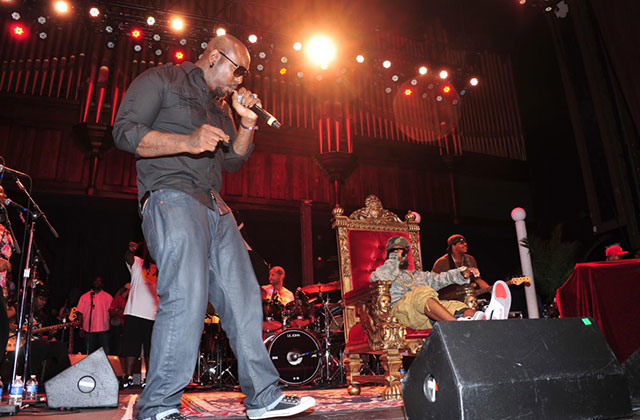On Saturday (August 10), more than 3,000 Black people will celebrate the 25th anniversary of FunkJazz Kafe Arts and Music Festival in Atlanta. Janelle Monáe, Erykah Badu, India.Arie, OutKast and Omar have all previously performed at the festival backed by FunkJazz Kafe’s (FJK) house band The Chronicles, but the thousands of concertgoers who show up each year never know who will take the stage until they arrive at the venue.
Having spent a quarter of a century working with musicians, FJK creator Jason Orr has seen his share of changes in Black music and culture. He talks to Colorlines here about what he thinks threatens Black music and where he thinks its future lies.
How do you keep FunkJazz relevant in a sea of other festivals?
I tap into the culture. There’s music, fashion, indie filmmaking, technology. Dance, theater, literary arts, spoken word. I highlight all of those things and draw on those communities to participate in FunkJazz. When you see Coachella or Bonnaroo,* they’re giving you a list of performers, but they’re not saying, “Come to the poetry suite, get a healing massage; come to the market place and spend money with local vendors; visit the vegan court and make a holistic change in life; here’s a salon to learn about transitioning to natural hair.” Things that mean something personally. Music is the background. We have a saying: You’ll know the condition of a people by what they reflect in their music.
What do you see being reflected in music today?
FunkJazz has brought Cornel West and Dick Gregory to tell us how we got here. Hip hop will never leave Atlanta, but it has killed music. As a culture, everything can’t be all nursery rhyming, mumble rapping. The Migos will be in the Hall of Fame for what they do, but in Atlanta, OutKast is the funniest duo in rap. Goodie Mob was funny. Cee-Lo was funny. But they were rhyming like they spoke. They’re authentic to who they are.
Then you have the TV shows. “Love in Hip Hop,” “Bad Girls Club,” “Atlanta Housewives,” “Atlanta,” the TV show. The reality scripted shows created another culture. The Super Bowl, the Olympics. People come to Atlanta with expectations of what they saw on TV. When I was growing up, we had teen clubs for the under 21, so we were already acclimated to clubs and that has a lot to do with how you evolve culturally. Going to a performing arts high school, performing in talent shows, dancing. We grew up, thank God, for hip-hop, b-boying, doing graffiti or calligraphy. I was making mix tapes, scratching records, break dancing, rapping. That’s enough to keep you busy and interested in the arts and to get better. We had technology, but it wasn’t better than the music were listening to.
Why do you have the house band, The Chronicle, collaborate with these different artists?
I try to keep our show like an award show. When you have an idea with one band and you’re doing a bunch of styles—rock, blues, hip-hop, funk—you want continuity. You don't want to lose people in set changes, but jump them off into the next thing. So we might take Gary Numan’s “Cars” and make it Black and then jump into Phyllis Hyman’s “You Know How to Love Me” and then jump up into Ten City and house music.
If I told you Pharoahe Monch was going to be there and perform “Simon Says” you would say, “Meh, I don’t know if that’s worth my $25.” But I have him do it with eight tubas. Sometimes I'll have a violinist and Black people will come to me later and say, “I didn’t know Black people played violin.” But when I was younger, before seeing Arthur Ashe, I didn't know Black people played tennis.
How has Black music changed over the years?
Categorizations killed us off. Erykah, Jill, Joy, they all said, “Don’t call me neo soul.” Instead of saying these are progressions of Sly Stone, Prince, they said that’s neo-soul, so put that over there. It's some subgenre shit they made up. And we did that ourselves. Kedar [Massenburg] became the head of Motown and because he had to call his artists something that was different from the classic legacy of Motown, he called it neo soul and that was for the purpose of commerce, not for culture, community-building and craftsmanship.
It has been imitated for the purpose of a corporate gain, not for community advancement. The major press won’t write about someone that’s a legend in Atlanta, but they’ll write about a Trap Museum. Things that should be celebrated aren’t. We’re living in a world of repeats, so who knows where we'll be in five years. They’re going to make “Shaft” five more times. Their going to remake “Coming to America” and I’m scared. Everything they do on us is wrong, and they’re killing us off in biopics. Ray Charles’s biopic wasn’t right. James Brown’s wasn’t right. Zoe Saldana as Nina Simone? Even Miles Davis. They didn’t have one scene of him playing the trumpet, but they did have one of him being in a shootout.
Talk a little about FunkJazz’s civic engagement in the community.
Our civic engagement started when we started. There was flooding in South Georgia and I wanted to discount the price if people brought bottled water that we could ship. If someone’s house burned down, we’d offer what was timely: water, toiletries, simple things. Then it evolved to food for the homeless. The ticket price is $25 and I started offering a $5 discount if you gave the $5 to the homeless guy on the corner. In 1996, we started donating clothes to the homeless. Over that time, we’ve almost generated 1 million plates of food to different organizations.
*Piece has been updated to correct the spelling of Bonnaroo.
